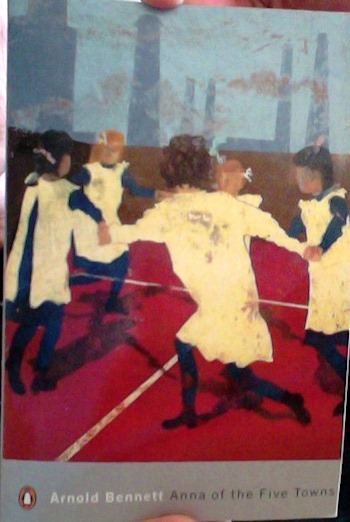Inspiring Older Readers
 posted on 02 May 2022
posted on 02 May 2022
Anna of the Five Towns by Arnold Bennett
Born in 1867 in Hanley, Stoke-on-Trent, Arnold Bennett wrote thirty-seven novels, seven volumes of short stories and thirteen plays. Little of this body of work is read today for Bennett is one of those great Edwardian men of letters who has fallen utterly out of fashion.
But in the mid-1970s he enjoyed a brief surge in popularity when his Clayhanger trilogy was dramatised for TV. I’m sure I read the Clayhanger trilogy and perhaps one or two other titles at roughly that time but all they left behind was an abiding impression of Bennett as a somewhat dour, able utilitarian writer whose primary claim to fame was his militant provincialism, his determination to put ‘the Five Towns’ of the Potteries not just on the literary map but in the public consciousness of a national reading public.
Partly to find out how wrong my assessment of five decades ago was likely to be, this week I rummaged out an Oxfam copy of Anna of the Five Towns, which I had never read before, and settled down with it.
First of all, let me say that whatever I thought I knew about Arnold Bennett was largely confounded. Anna of the Five Towns is a marvellous book, and must surely rank amongst his best. This is partly because Bennett’s ability to create characters is masterful. But there is also another equally important consideration – and one that I was surely entirely ignorant of when I read the Clayhanger books all those years ago. I’ll try and explain.
In a famous spat with Virginia Woolf in the 1920s Bennett said that the creation of character was fundamental to the purpose of fiction and that without the presence of believable, living, breathing characters the novel would be doomed to die out. He undoubtedly had in mind the ethereal and rarefied characters of Woolf's fiction, which he believed couldn’t possibly survive in the real world.
While Bennett may well have believed what he said about character creation, Anna of the Five Towns made me realise that his insistence on character creation was only half the truth. Equally important to Bennett was an ability to depict the societies, the landscapes, the places, the economies and the social attitudes his characters inhabit and his models in this were the nineteenth century French realists, Maupassant, Flaubert, Balzac and Zola. In Anna of the Five Towns he transplanted these techniques of social as well as character analysis to the ignored, isolated small pottery-making towns of Staffordshire.
Anna of the Five Towns is the story of Anna Tellwright, the older daughter of twice-widowed Ephraim Tellwright – an embittered, blunt, miserly man, as ruthless and self-serving in his own version of small capitalism as he is rude and tyrannical in the household he dominates. But as he unfolds this story – Anna’s inheritance of a fortune from her grandfather, her efforts towards greater independence, her eventual marriage to Henry Mynors, stalwart of the region’s dominant strand of Methodism and owner of a successful modern pottery factory, and most of all the bankruptcy and tragic suicide of one of the Tellwright’s tenants – Bennett takes a scalpel to Potteries society and lays bare a world of bourgeois respectability and hypocrisy, self-serving piousness, domestic tyranny and small-minded bigotry. It is an extraordinary achievement.
A bare recounting of the plot may sound melodramatic, but what saves the book from melodrama is the social context Bennett wants us to understand. For he isn’t just telling us a story: at every step he is revealing and explaining the social and economic circumstances that make this story not just possible, but likely, perhaps inevitable, certainly believable.
The book that Anna of the Five Towns most put me in mind of was not Balzac’s Eugénie Grandet, which I haven’t read and which was Bennett’s model, but Zola’s The Ladies’ Paradise, in which the story (albeit a very different one) is similarly played out against a backdrop of late-nineteenth century social and economic forces that make it possible – in Zola’s case, consumer capitalism and its defining, hyper-modern expression, the department store.
This chance comparison helped me understand more about Bennett’s methods than I had ever previously grasped. His audacious transplanting of European realism to the bleak, grimy, small Midlands towns of the Potteries! The bravura – and essentially masculine – confidence and authority of the man.
I must say, I felt a sudden sympathy with Virginia Woolf. Bennett after all was just one in that jostling crowd of eminent men who dominated literary and intellectual life in the opening years of the twentieth century. Their stout handmade shoes pounded up the steps of their gentlemen’s clubs, they flung their sticks and capes and Ulsters to the footmen and scattered cigar ashes and called for brandy-and-water. My God, they would have been insufferable. But for an example of the scale and scope of literary ambition at the dawning of the twentieth century, read Anna of the Five Towns.
Almost fifty years ago Bennett’s biographer Margaret Drabble wrote, “I find his impact completely undiminished by time.” Her assessment was accurate then and it continues to be. A genuinely remarkable novel.
Alun Severn
May 2022
Arnold Bennett elsewhere on Letterpress:
Riceyman Steps by Arnold Bennett